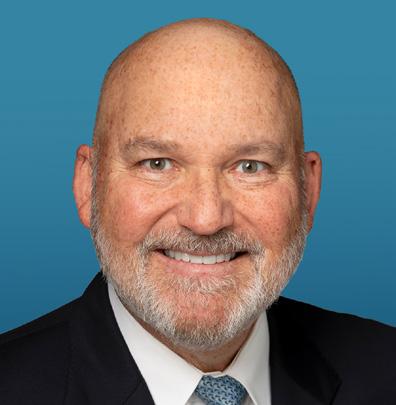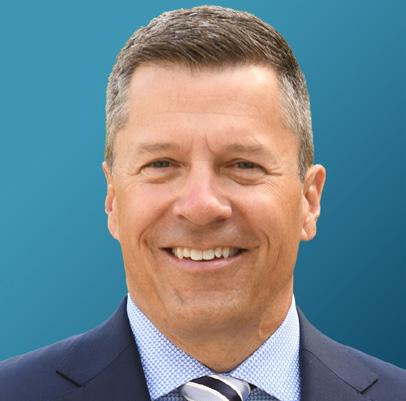
www.okstatechamber.com www.okstatechamber.com/foundation www.okbusinessroundtable.com BUSINESS LEADERSHIP ADVANCING OKLAHOMA’S ECONOMY 2023 OKLAHOMA BUSINESS LEADERS POLL EXECUTIVE HIGHLIGHTS
ABOUT THE BUSINESS LEADERS POLL
The Business Leaders Poll (BLP) is the “pulse check” of the Oklahoma business community. A collaborative project of The State Chamber, the Oklahoma Business Roundtable, and The State Chamber Research Foundation, the BLP is the only statewide, scientific survey that annually measures the sentiments, concerns, and outlook of business leaders—from the C-suites to the corner stores—who shape Oklahoma’s economy.
The BLP is meant to be a resource for businesses, policymakers, and the public. It was conceived with the conviction that it is impossible to create the conditions for a prosperous and growing Oklahoma without first understanding the views of those who are on the front lines of Oklahoma’s economy, the business leaders we are counting on to deliver that future Oklahoma.

www.okstatechamber.com www.okstatechamber.com/foundation www.okbusinessroundtable.com BUSINESS LEADERSHIP ADVANCING OKLAHOMA’S ECONOMY
A PULSE-CHECK ON BUSINESS SENTIMENT
We are pleased to present the 2023 edition of the Oklahoma Business Leaders Poll. This annual survey provides critical insight into the sentiments, concerns, and outlook of the Oklahoma business community, from the C-suite to the corner store. The poll—now in its third iteration— continues to evolve and expand, improving its value as a tool for policymakers, business leaders, and the public.
For the second year in a row, we have broadened the scope of leaders surveyed beyond the memberships of the Oklahoma Business Roundtable and The State Chamber, reaching a diverse sample of businesses across the state. This year, 418 business leaders took the poll, our largest number to date. Our goal is to survey a truly representative sample of businesses in Oklahoma, and the high—and growing—participation rate reflects our commitment to that objective. The insights gathered this year reflect the perspectives and experiences of a wide range of business leaders throughout the state, which ensures that the BLP grows ever more insightful in gauging business sentiment.
The 2023 BLP demonstrates that the outlook for Oklahoma’s business environment is strong, and business leaders understand their unique role in keeping it that way.
70% of business leaders believe things in the Oklahoma economy are going in the right direction compared to the national economy.
83% of Business Roundtable and The State Chamber members share this optimistic view.
Nearly half (44%) of business leaders expect to expand their workforce in the coming year.
81% of business leaders believe business can and should be a powerful force for good in society by encouraging dialogue, speaking out, and making a real impact by leading on societal issues.
Members of The State Chamber and Business Roundtable, in particular, understand the positive role business can play, with 86% agreeing
76% of business leaders believe the business community in Oklahoma should be involved in leading the charge to improve Oklahoma.
Fully 88% of The State Chamber and Business Roundtable members agree that business should be involved in leading the charge to improve Oklahoma, and nearly 2/3 see themselves as having a special responsibility to do so
The survey also highlighted important areas in need of improvement for Oklahoma’s economic growth:
Workforce and education remain the top concern for business leaders, with nearly half (44%) choosing those as the top issue facing business in the state.
Workforce and education beat out the next closest public policy priority, taxes and incentives, by a nearly 4 to 1 margin (44% to 12%)
418 business leaders took the poll, our largest number to date.
3
When expanded to include businesses’ top two issues to profitability and growth, government regulation and taxes join workforce as a top concern.



81% identify workforce (employee recruitment and retention) as a top two issue;
59% identify government regulations and mandates as a top two issue; and
32% identify taxes as a top two issue.
The BLP is an invaluable resource for our organizations and policymakers as we collaborate to improve Oklahoma’s economic climate and enhance its competitiveness. We are grateful for the active participation of the Oklahoma business community in helping Oklahoma grow and prosper—making their voices heard through our survey is a key part of that. As we continue to expand the BLP’s reach and refine its methodology, we aim to continually deliver a robust and reliable resource that informs decision-making and shapes public policy to benefit Oklahoma’s economy.
With a strong business community leading the way and public policy grounded in robust data, Oklahoma’s economic future is bright.
Sincerely,
CHAD WARMINGTON President & CEO
The State Chamber
BEN LEPAK Executive Director The State Chamber Research Foundation
MARK FUNKE President & CEO Oklahoma Business Roundtable
4
BUSINESS DRIVES OKLAHOMA’S SUCCESS
Business leaders in Oklahoma recognize businesses are a powerful force for good in the state. Their belief in the positive impact of business and free enterprise in society and their involvement in improving Oklahoma is strong.
81%
81% of business leaders believe business can and should be a powerful force for good in Oklahoma by encouraging dialogue, speaking out, and making a real impact by leading on societal issues
Members of The State Chamber and Business Roundtable, in particular, understand the unique and positive role business can play, with 86% agreeing.
76%
76% of business leaders believe the business community in Oklahoma should be involved in leading the charge to improve Oklahoma
Chamber/BRT members see business as having a special responsibility to improve Oklahoma – fully 88% believe business should be involved in leading the charge to improve Oklahoma, and nearly 2/3 see themselves as having a special responsibility to do so.
KEY TAKEAWAYS:
X A remarkable 81% of business leaders understand and acknowledge the transformative role that businesses can have in Oklahoma by actively engaging in dialogue and leading on societal issues.
X Members of The State Chamber and Business Roundtable, in particular, recognize the unique responsibility and opportunity that businesses possess, with 86% agreeing on the positive role businesses can play.
X Business leaders are committed to being active agents of positive change in Oklahoma and to making significant contributions to improve the state.
5
ECONOMIC & BUSINESS TRENDS
Business leaders see Oklahoma as a place for entrepreneurism and growth. While businesses continue to grapple with changing national trends, such as the rise of remote work and supply chain disruptions, things appear to have leveled out compared to recent years.
DIRECTION OF OKLAHOMA’S ECONOMY
70% 83%
70% of business leaders believe things in the Oklahoma economy are going in the right direction compared to the national economy.
83% of Chamber and Business Roundtable members share this optimistic view
OKLAHOMA BUSINESSES ARE EXPANDING
44% of business leaders expect their workforce to increase in the coming year, either substantially (5%) or moderately (39%).
A significant portion, 47% of business leaders, anticipate their workforce to stay about the same.
Only 8% of business leaders expect their workforce will decrease in the coming year.
SUPPLY CHAIN ISSUES
61% of business leaders indicate that they still have some concerns about supply chain issues, but have seen an improvement in the last year.
ENTREPRENEURISM IN OKLAHOMA
of business leaders consider Oklahoma a good place to start a business
90% 9%
of business leaders DO NOT consider Oklahoma a good place to start a business
44%
47%
61%
8%
6
51% 40% 13% 42%
REMOTE WORK TRENDS
Around half (51%) of Oklahoma business leaders report employing remote workers.
40% of Oklahoma businesses expect the number of remote positions in their company to stay about the same.
Only 13% expect an increase in remote positions, while only 6% anticipate a decrease in remote positions.
42% of business leaders who have remote employees agree that a significant reason for having remote employees is the inability to meet workforce demands without providing this flexibility.

KEY TAKEAWAYS:
X 70% of business leaders believe the Oklahoma economy is heading in the right direction compared to the national economy.
X 44% of business leaders expect their workforce to increase in the coming year.
X Supply chain concerns persist for 61% of business leaders, although improvement is noted.
X Oklahoma is viewed as a very good place to start a business by 28% of business leaders, with 62% considering it somewhat good. Only 9% believe Oklahoma is a very or somewhat bad place to start a business.
X Only a negligible percentage (1%) of business leaders expect a substantial increase in remote positions, while 40% anticipate the number of remote positions to remain stable.
X Among those with remote employees, 42% agree that having remote employees is required to meet workforce demands.
7
PUBLIC POLICY PRIORITIES FOR BUSINESS
Workforce development and education remain the dominant public policy concerns for Oklahoma business leaders in 2023. In addition to improving the workforce talent pipeline, business leaders report obstacles from government regulation at all levels (federal, state, and local), and believe the state legislature should focus tax reform on individual income tax and taxes on businesses rather than sales or property tax.
MOST IMPORTANT ISSUES FACING BUSINESSES IN OKLAHOMA
TOP TWO ISSUES AFFECTING PROFITABILITY AND GROWTH OF BUSINESSES 44% 12% 9% 7% 6% 1% 1% 21% WORKFORCE & EDUCATION TAXES & INCENTIVES ECONOMY GOVERNMENT LEADERSHIP REGULATIONS SUPPLY CHAIN INFRASTRUCTURE UNDECIDED (Total = 1st issue/2nd issue) EMPLOYEE RECRUITMENT AND RETENTION 81% 52% / 29% GOVERNMENT REGULATIONS/MANDATES 59% 22% / 37% TAXES 32% 12% / 20% ACCESS TO CAPITAL 19% 8% / 11% LEGAL COSTS/FRIVOLOUS LAWSUITS 4% 1% / 3% DON’T KNOW 5% –8
BURDEN OF REGULATIONS
TAX REFORM PRIORITIES
OF OKLAHOMA STATE LEGISLATURE IN ESG MATTERS
ROLE
NATIONAL
34% 25% 20% 13% 8% INDIVIDUAL INCOME TAX TAXES ON BUSINESS SALES TAX PROPERTY TAXES UNDECIDED Very Burdensome Extremely Burdensome Only Somewhat Burdensome Not a Burden at all 14% 6% 3% 19% 23% 44% 26% 14% 6% 37% 52% 44% STATE REGULATIONS FEDERAL REGULATIONS LOCAL REGULATIONS 15% Require or encourage ESG policies 15% Increase awareness of Oklahoma products and services 7% Prohibit or discourage ESG policies 18% Secure corporate investment in Oklahoma companies 22% Attract skilled workers in needed areas 31% Attract people to the state to build the available workforce 72% Let companies decide for themselves 6% Undecided 9
SUPPORT FOR
MARKETING CAMPAIGNS
KEY TAKEAWAYS:
X Workforce and education remain the most important concerns for businesses in Oklahoma.
X Taxes, government regulations and mandates, and employee recruitment and retention significantly impact profitability and growth.

X Federal regulations are seen as burdensome by a majority of business leaders, with 40% considering them extremely or very burdensome.
State regulations are perceived as somewhat less burdensome, with 20% considering them extremely or very burdensome.
X The strong majority of business leaders (72%) believe the Oklahoma State Legislature should stay out of the business of private companies and let each company decide their own environmental, social, and corporate governance policies.
X There is support for substantial investments in national marketing campaigns to increase awareness, secure corporate investment, attract skilled workers, and build the available workforce.
10
DRILLING DOWN ON WORKFORCE
Oklahoma businesses continue to face workforce challenges, continuing a trend as the top issue cited for multiple years running. The 2023 BLP dove into the specific nature of businesses’ workforce challenges, providing further nuance related to difficulties filling vacancies, the quality of the workforce, concerns with the available workforce, and the role of education in improving the available workforce. The survey also explored opinions on state incentives for childcare, afterschool care, housing development, and the performance of higher education institutions in preparing students for the workforce.
BUSINESS PERCEPTIONS OF WORKFORCE BY THE NUMBERS
Most Difficult Category of Worker to Fill Vacancies
Entry level: 29%
Skilled, including individuals with credentials: 50%
College degree: 11%
Executive/Management: 7%
Reasons for Not Rating Available Workforce Higher
Work Ethic: 19%
Need Specific Skills/Experience: 29%
Not Enough Applicants/Workers: 20%
Competitive Wages: 3%
Do Not Know: 30%
Concerns with Growing and Retaining a Workforce
Workers leaving Oklahoma entirely: 25%
Workers leaving the workforce: 27%
Workers leaving for other opportunities within Oklahoma: 43%
Do Not Know: 5%
Reasons Workers Leaving the Workforce
Retiring: 19%
Family striking a different work/life balance: 18%
Safety net eliminating the need to work: 54%
Quality of Oklahoma’s Existing Workforce
Very satisfactory: 9%
Somewhat satisfactory: 44%
Somewhat unsatisfactory: 37%
Very unsatisfactory: 9%
Greatest Concerns with the Available Workforce
Finding employees with durable skills: 50%
Finding employees trained with technical skills: 24%
Finding employees with required college degrees and experience: 10%
Retaining employees: 14%
Destination of Workers Leaving Oklahoma Texas: 62%
Another neighboring state: 15%
Another state in the south: 8%
The west coast: 4%
The east coast: 6%
Somewhere else: 1%
Reasons Workers
Leaving
for Other Opportunities within Oklahoma
More pay: 63%
To start their own business: 2%
For another part of the state with better quality of life: 5%
For flexible scheduling: 24%
11
WORKFORCE BY THE NUMBERS
Primary Education Focus for Improving Workforce
Elementary school levels: 26%
High school levels: 49%
Career tech system: 20%
College levels: 3%
Agreement with Expanding Availability of Afterschool Care to Improve Workforce
Agree: 82%
Disagree: 16%
Do Not Know: 2%
Support for State Incentives to Expand Childcare Capacity to Improve Workforce
Favor: 79%
Oppose: 18%
Do Not Know: 2%
Support for Policies Encouraging Housing Development for Workforce Recruitment
Favor: 69%
Oppose: 28%
Do Not Know: 4%
HIGHER ED TO WORKFORCE
OKLAHOMA’S HIGHER ED SYSTEM NEEDS TO DO A BETTER JOB OF INCENTIVIZING STUDENTS TO STUDY IN FIELDS WHERE THERE IS A GREATER WORKFORCE NEED.
KEY TAKEAWAYS:
X Skilled workers without a 4-year degree are the most challenging vacancies to fill.
X Nearly half (46%) of business leaders are dissatisfied with the quality of Oklahoma’s existing workforce
X A majority (54%) of business leaders see workforce shortages due to the social safety net eliminating the need to work.
X There is strong support for state incentives to expand childcare capacity and availability of afterschool care to enhance the workforce.
X Most respondents favor policies encouraging housing development to improve workforce recruitment.
X Fully 83% of business leaders believe the higher ed system needs to do more to incentivize students to study fields with greater workforce demand.
STRONGLY AGREE SOMEWHAT AGREE SOMEWHAT DISAGREE STRONGLY DISAGREE UNDECIDED 47% 36% 12% 3% 2% 83% AGREE 12
TAXES, REGULATIONS, AND INCENTIVES
This section explores opinions on providing incentives to bring manufacturing and production jobs from overseas to Oklahoma, as well as perceptions of taxes and regulatory burdens on businesses. It also examines preferences for tax policy reform and the types of regulations that are considered burdensome.
Too much: 30%
Not enough: 5%
Taxes
25%
Property taxes: 13%
Sales tax: 20%
Undecided: 8%
Burden
Extremely/Very Burdensome: 40%
Somewhat Burdensome: 37%
Not a Burden at all: 19%
Undecided: 4%
About the right amount: 55%
Undecided: 10%
Burden
Extremely/Very Burdensome: 9%
Somewhat Burdensome: 44%
Not a Burden at all: 44%
Undecided: 4%
Burden of State Regulations
Extremely/Very Burdensome: 20%
Somewhat Burdensome: 52%
Not a Burden at all: 23%
Undecided: 4%
Tax Policy Reform Most Needed to Make Oklahoma More Competitive on a Regional Basis Individual income tax:
34%
on businesses:
of Federal Regulations
of Local Regulations (County and Municipal)
State & Local Tax Burden on Business
13
RE-SHORING FOR NATIONAL SECURITY
OKLAHOMA SHOULD PROVIDE INCENTIVES TO BRING MANUFACTURING AND PRODUCTION JOBS FROM OVERSEAS TO THE STATE FOR SECTORS VITAL TO NATIONAL SECURITY LIKE COMPUTER CHIPS AND PHARMACEUTICAL INGREDIENTS, OR OTHERS AFFECTING HEALTH AND SAFETY.
RE-SHORING SUPPLY CHAINS
OKLAHOMA SHOULD PROVIDE INCENTIVES TO BRING MANUFACTURING AND PRODUCTION JOBS FROM OVERSEAS TO THE STATE FOR SECTORS THAT PROVIDE INPUTS FOR EXISTING OKLAHOMA COMPANIES, SO OUR EXISTING COMPANIES HAVE FEWER SUPPLY CHAIN ISSUES.
KEY TAKEAWAYS:
X Around one-third of businesses believe they pay too much in state and local taxes, while the majority believe they pay about the right amount.
X Business leaders identify the individual income tax as the top priority for tax reform to improve competitiveness, followed by taxes on businesses.
X Federal and state regulations are seen as at least somewhat burdensome by a substantial majority of businesses (77% with regard to federal; 72% with regard to state), but business leaders identify federal regulations as more burdensome than state regulations.
X There is significant support for providing incentives to bring manufacturing and production jobs from overseas to support existing Oklahoma companies and reduce supply chain issues, as well as for sectors vital to national security and health.
STRONGLY AGREE SOMEWHAT AGREE SOMEWHAT DISAGREE STRONGLY DISAGREE UNDECIDED 57% 30% 11% 3% 1%
STRONGLY AGREE SOMEWHAT AGREE SOMEWHAT DISAGREE STRONGLY DISAGREE UNDECIDED 47% 41% 6% 4% 3% 14
ABOUT THE STATE CHAMBER
The State Chamber is the leading statewide advocate for business in Oklahoma. We work on behalf of our members, the Oklahoma business community, to affect legislative change and create a pro-growth climate statewide. The State Chamber leverages meaningful partnerships, resources and coalitions to achieve legislative results that strengthen Oklahoma’s economy.
www.okstatechamber.com
ABOUT THE OKLAHOMA BUSINESS ROUNDTABLE
The Oklahoma Business Roundtable (BRT) serves as Oklahoma’s primary economic development support organization. BRT promotes new business investment throughout Oklahoma, including funding support for start-up, retention, expansion and attraction of business facilities and operations. Formed in 1991, the Roundtable is a 501(c)(6) nonprofit, non-partisan corporation.
www.okbusinessroundtable.com
ABOUT THE STATE CHAMBER RESEARCH FOUNDATION
The State Chamber Research Foundation (SCRF) is the business community’s think tank. Through high quality research and analysis, SCRF educates policymakers and the public about the virtues of the free enterprise system, the public policy ideas that enable free enterprise to thrive, and the positive contributions of the business community to the prosperity and welfare of the people of Oklahoma. As a non-profit, non-partisan research and education organization, SCRF is dedicated to advancing free markets, increasing opportunity, and growing prosperity.
www.okstatechamber.com/foundation
BUSINESS LEADERSHIP ADVANCING OKLAHOMA’S ECONOMY 15

www.okstatechamber.com www.okstatechamber.com/foundation www.okbusinessroundtable.com BUSINESS LEADERSHIP ADVANCING OKLAHOMA’S ECONOMY 2023 OKLAHOMA BUSINESS LEADERS POLL EXECUTIVE HIGHLIGHTS







